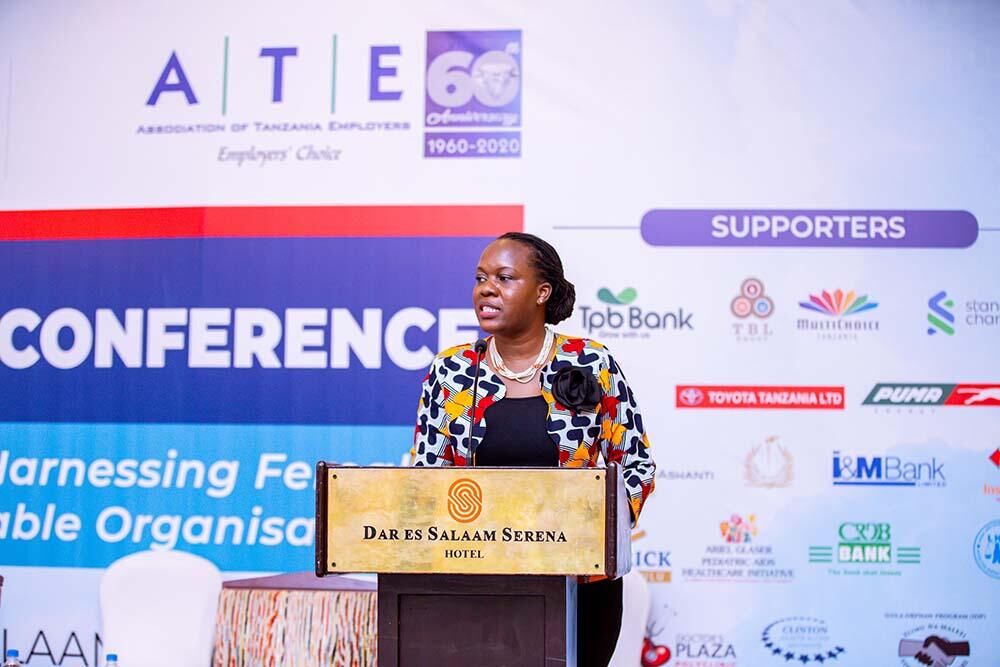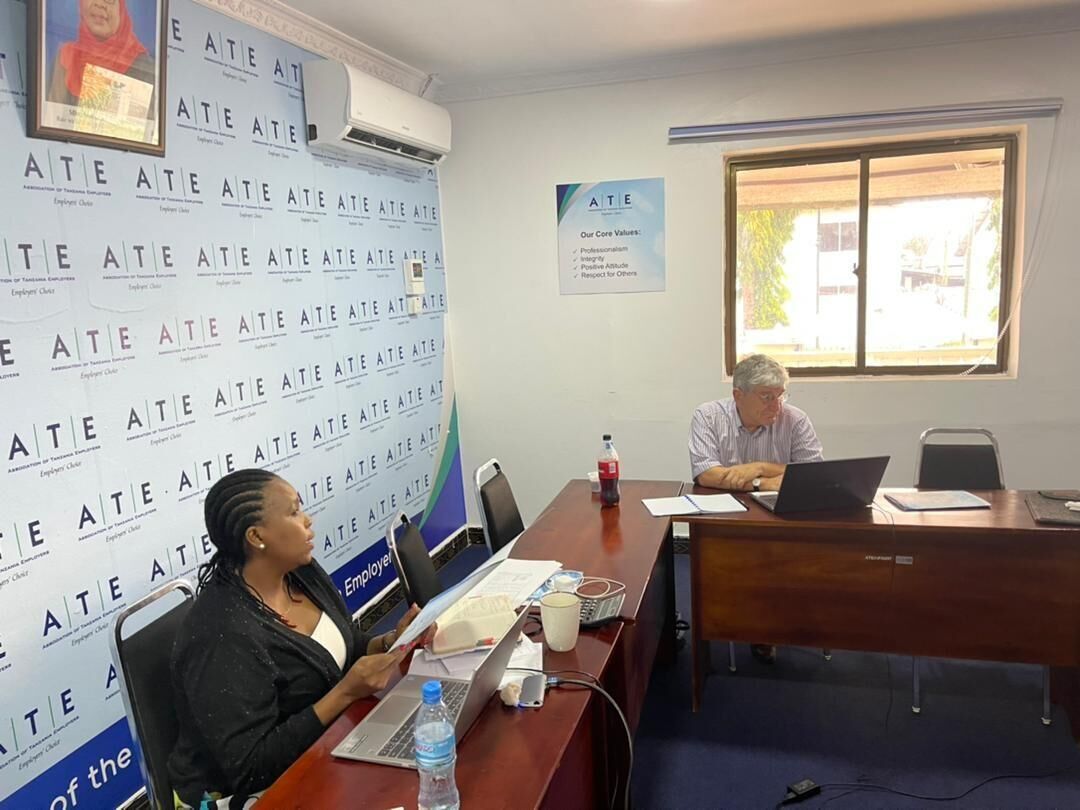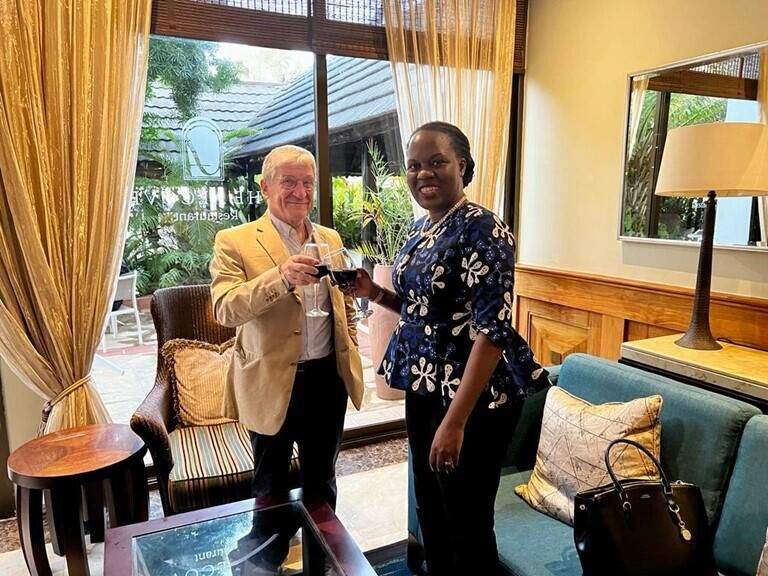

TANZANIA : FOCUS ON MEMBERSHIP AND SOCIAL DIALOGUE
In a number of meetings with the DECP country manager Arnout de Koster, the Association of Tanzania Employers (ATE), DECP’s partner organisation, presented and refined its plans for the implementation of the current workplan. The main objective is to complete it with some concrete actions by the end of 2022. The discussions were an occasion to share experiences of neighbouring countries and transfer some knowhow on the functioning of employers’ associations in two key area’s for employers organisations: membership and social dialogue.
In the field of membership, ATE decided, in the cooperation with DECP, to mainly focus on the structural reinforcement of its membership policy. Instead of trying to develop some evident incremental improvements in promotional material or other current activities for recruitment – how important and useful they may be- the choice went to look for assistance and support towards a more structural support.
ATE indeed has been interested and triggered by an innovative experiment which the colleagues of Kenya developed: i.e. a more in-depth data mining approach regarding members’ interaction with the association. Such datamining is based upon data collected via the customer relations management (CRM° system), which DECP introduced together with ITCILO some years ago. It registers all types of services which companies get from the association, and specifies quite a number of information, which allows a much better insight in what companies use the association for.
The new project of datamining allows to reply to interesting questions on clients (and members). Questions such as who uses the associational services (members or also non-members, which sector do the users belong to, what is their size); questions such as the preferred services and which contents like which themes, which format of services: training, consultancy, email etc.). In sum, these and other key features of the services delivery and interaction company-association will now be mapped, starting from the raw data which are collected every time a service is rendered.
Via intelligent datamining the association will indeed get a good view on the present preferences and customer behaviour of the members and non-members, and be able to adapt the offers better to the client’s needs.
The choice made by ATE is a long term choice which makes membership policy more scientific and which basically implements what also commercial companies develop constantly: a better insight in the customer needs and behaviour, to ensure that the association remains relevant, client oriented and flexible.

Mrs Suzanne Ndomba and Mr Arnout de Koster at work at the ATE office
In the field of social dialogue, the association also has some ambitions to move forward. Two projects single out: a project to launch social dialogue in the tourism sector and the organisation of a reflection day with top stakeholders on the future of social dialogue in Tanzania. Both to be organised before the end of the year.
The launch of social dialogue in the tourism sector is linked with the importance of the sector and the Covid events. The sector is of prime importance in Tanzania, with a contribution of 15% to GDP and an employment share of grosso modo the same order. Under Covid it was under serious pressure and even now the post Covid situation has not yet restored the sector to its pre Covid situation. The consequences of Covid on labour also led to the questioning of how the social climate can be improved and how social dialogue at sector level can contribute.
Basically, that will also be the question for the launch event, where a study will be presented. This study will serve as an introduction for a discussion between the main stakeholders in the sector on employers side, the union side, and the government. The agenda of where social dialogue can play a role is wide: skills, working conditions, seasonality, social protection, conflict resolution, and so on.
At a broader level, a similar questioning, but now at national level, will be the main subject of the reflection event on the future of social dialogue in Tanzania, the second key event for the social dialogue activities. Social dialogue exists obviously in Tanzania. At national level via the national tripartite concertation body Lesco, and some other more specific sector (e.g. training, social security, health and safety) oriented bodies of mainly tripartite dialogue.
But the real long term question is how the partners can examine and respond to the need to make social dialogue in many formats more dynamic and of higher added value.
The reflection day hopes to stimulate the real commitment and willingness to go further and give social dialogue- not only as instrument but also as value- an additional impetus. It will start by assessing its present state of functioning, its effects, its added value and the gaps. The assessment is to be followed by a review of the experiences of social dialogue in the African context at national and sectoral level.
And finally, the main corpus is to develop some ideas for a better functioning and for the maximalisation of its added value from different angles. We cite some of these angles. Thematically: where can it create progress , e.g. in skills policies, in social policy, in conflict prevention and resolution or other area’s? Legally: what is required to create a legal framework to promote sound and enforced social dialogue? Politically: what is needed to create more trust and conviction that social dialogue is worth the efforts? Technically: which competencies need to be developed further via training ?
This ambitious agenda which, as it is hoped, will generate new ideas and real progress to create the conditions for a better Tanzania. DECP is proud to be co-launching this important reflection.

Mrs Suzanne Ndomba, CEO of the Association if Tanzanian Entreprises (ATE) and Mr Arnout de Koster, Country Manager of DECP) congratulate each other with the results of their cooperation